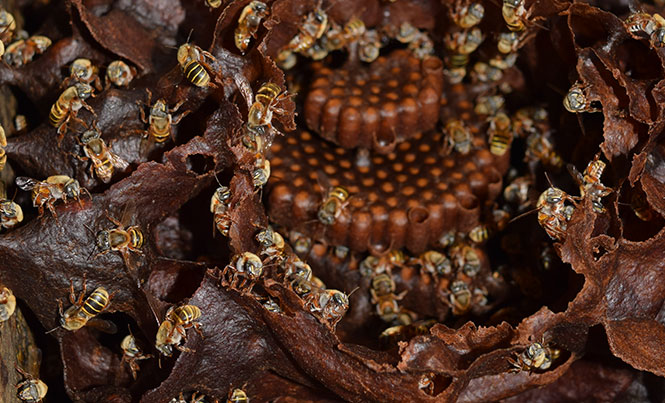
Where are you from?
I was born in Guadalajara. I decided to move because I didn’t know what to do with my life after college. I was going to live for four months in Playa del Carmen and those became four years.
Where did the idea for this project come from?
I traveled to Maya communities in Carrillo Puerto where I discovered melipona bees and learned about Maya culture. When I traveled to Carrillo, I reconnected with nature and our awesome cultural heritage and I felt a responsibility to do something about it. The melipona beekeepers were very kind when they opened their legacy to me and I felt inspired.
Then I realized I was focusing only on meliponas, but being a melipona beekeeper is something you dedicate yourself to out of love only, not for business. So, I met Don Carlos Hau, a super beekeeper, and he taught me about apis mellifera bees (stinging bees) and that’s how Maya Bacab really started as a sustainable project.
Melipona bees are native, stingless bees from America. What I love about meliponas is not only their importance for the pollination of crops and our environmental balance, but all the cultural traditions behind this little, but huge species. Melipona honey is essential for traditional Maya medicine. It is also accompanied by Maya ceremonies of gratitude for the harvest of honey and a request for preservation of jungle.
With these values, Maya Bacab was born – to revalue Maya culture through sustainable production and the commercialization of honey. Bacab refers to Maya gods that surround the beehive and the Earth; they are guardians of bees.
What kind of products do you have?
Pure honey, melipona honey, our Syrup of Gods (a Maya recipe of honey, royal jelly and pollen), propolis extract, pollen, honey with vanilla, royal jelly and honey soaps. Next year, we hope to add honey with cacao, new syrups and beauty ítems.
What are the benefits of your products?
Natural honey is antiseptic, probiotic, and strengthens the immune and digestive systems.
Melipona honey is better for eyes (cataracts, conjunctivitis, carnosities), skin diseases, allergies, and asthma.
Pollen is one of the best superfoods; it contains all the amino acids the body needs and prevents/helps rheumatism and anemia.
My favorite is the Syrup of Gods; the combination of honey, pollen and royal jelly gives you energy, improves memory and rejuvenates cells and skin.
Tell us about your tours.
Our tours are part of our commitment to raise public awareness of the importance of bees for the environment and to create experiences involving real cultural activities.
The first one is a tour of the jungle in Leona Vicario, a community on the Cenote Route. You get in touch with nature and learn about vanilla plantation, its history and pollination. We visit the melipona bees and you’ll learn secrets we’ve discovered working with them. It’s my favorite part of the tour. And let’s not forget about the cacao plants, where chocolate comes from. At the end, we thank the Gran Yaxché (Great Ceiba). It’s a new and simple concept to experience Mexican traditions and the Maya culture that we are so proud of.
Our second tour is a challenge for visitors who are not afraid of bees. We give you a suit and take you inside the beehives to see how bees live and the honey-making process. There is so much work behind a jar of honey, for the bees and beekeepers.
Bees and Maya communities changed my life and my whole perspective about nature, respect and cultural values and I want to share that with the world. A main goal for next year is to start training new beekeepers to reproduce bees while developing an economic activity. Part of our tour sales fund this project.
Also, we want to start a reforestation plan to contribute to restoring the Maya jungle.
And of course, we want to take Maya Bacab products all the world. I know it’s going to take us many years, but I think every great project started with vision and a lot of heart.
What would you like our readers to know about the Riviera Maya?
The Riviera Maya is far more than beach and sun. So, take a car and get into the wild of the jungle, get dirty and just ask people what they do. It is fantastic that “awesome” is part of the simple and traditional routine of many communities.